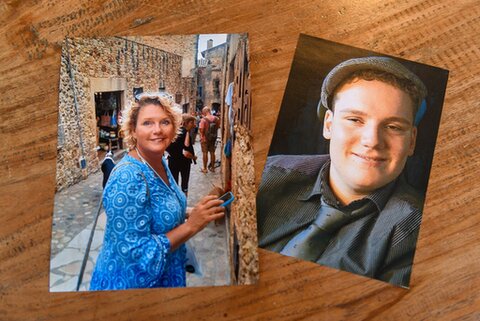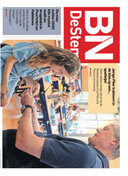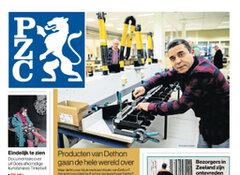Dik de Joode made the wishes of the deceased come true
How do you deal with the grief of a family?
We were only one and a half weeks into the new year when BD reporter Dik de Joode published one of the most compelling stories of 2024. He looks back with pride, but also with mixed feelings.
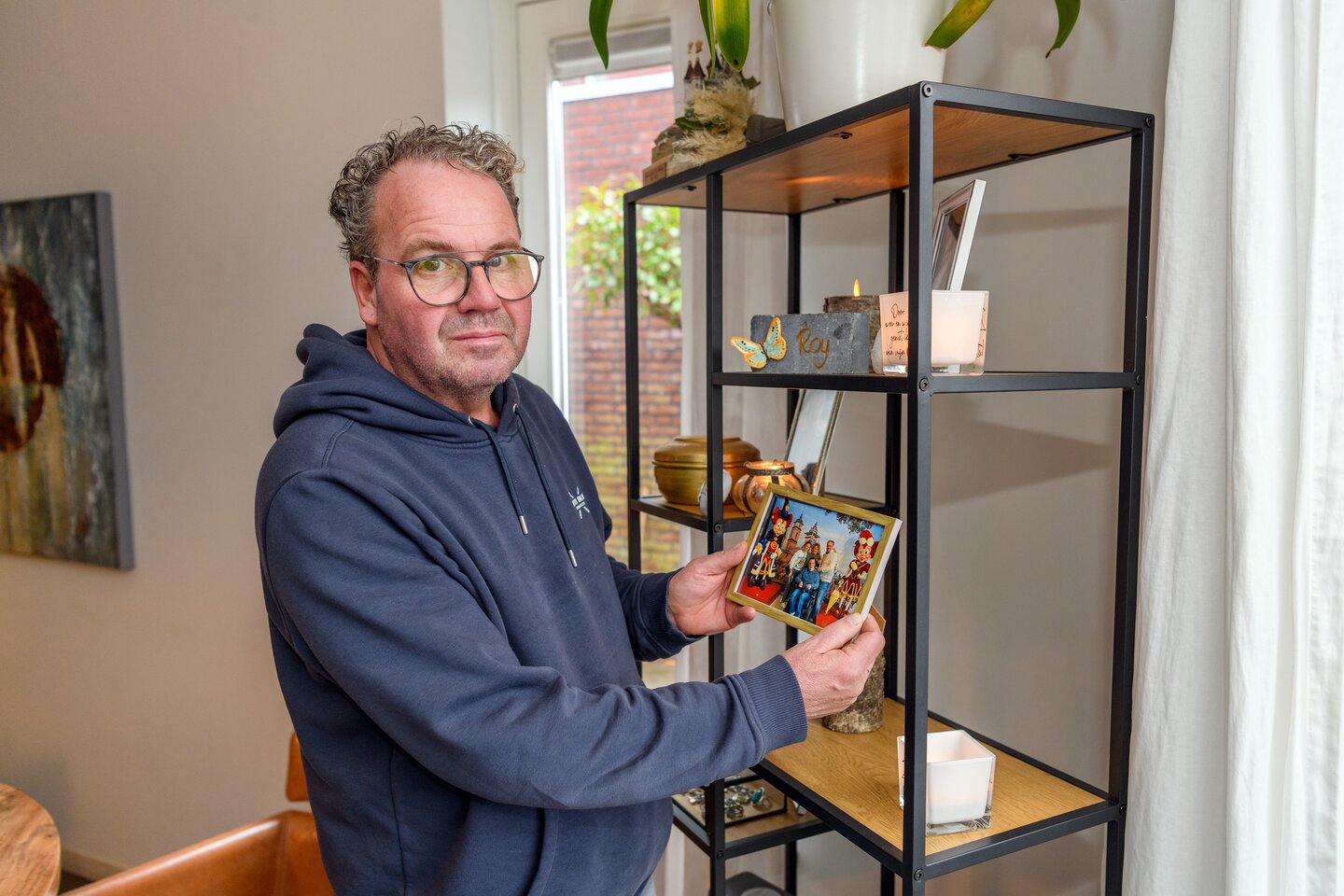
Roger Janssen at the memorial corner for his late wife Erica, together with their son Roy.
He received many compliments in that week. All his colleagues had read the story from cover to cover, and they were not the only ones. There were more than 1.3 million article views. He would have preferred a little less attention, mainly because of the drama that had preceded it.
Erica Janssen (aged 53) ended the life of her severely disabled son Roy (aged 25) and then her own life in their home in Drunen in the first weekend of October. She was tired of the years of caring for her son and the red tape and bureaucracy surrounding it.
When Dik de Joode walked into the town hall in Vlijmen on Monday for another appointment, he saw the memorial corner. Erica was a catering staff member there. “I got talking with the town hall messenger and they confirmed the rumours that I had already heard. I made it clear that I was not a sensation seeker, but that this was obviously a very unusual story”.
Initially he was told not to expect anything: the family was “angry with the press”. “Several 112 news photographers, not ours as it happens, had behaved very provocatively that night. But people at the town hall also said: we know who you are and how you work.”
Back at the editorial office he immediately said “don’t breathe down my neck, trust me, I’m working on it.” A few weeks later, Erica’s husband Roger called to say that he and his daughter Esmée would be willing to tell their story to BD.
More than 1.3 million article views, 130 conversions and great read-out graph
“What also played a role in this is that Erica wanted the story to be told.” She had stated that in one of the 200 letters that she had left for her family. It turns out that the lady from Drunen had been planning her act for two years. “Roger turned out to be a very open guy. That also places an extra responsibility on you to tell a good story with integrity.”
Before the story was published, Dik paid the family a final visit to obtain their feedback. “Even though it concerned relatively small things.” And there was close contact with AD and other brands regarding the time of publication, the headline and any changes.
Mixed feelings
During the weekend in which the story was published (in the Saturday paper and online on Sunday morning), compliments poured in via the app. “I had mixed feelings. I was doing well at the expense of someone else’s grief. One of the comments that I received was that the story was not over the top. This was very important for me because it is very easy to greatly exaggerate using only a few simple words.”
How does Dik look back on the process? “Together, we managed to create something of which we can be proud, at a time when media is under debate. I look back on it with a positive feeling. And even if that wasn’t the main goal, we were able to fulfil a kind of last wish for Erica.”
Alex van Lanen
Regional explainers very popular
Adding value to our journalism with videos: we succeeded in doing this in 2024 for our Brabant brands by focusing on regional explainers and explanatory videos. This was very popular.
This applied to a great variety of subject matters including Peter Gillis, De Efteling, millionaires and their private planes or a major traffic junction in Eindhoven that was being upgraded. A reporter explains exactly what it involves using images. People usually watch the explainers until the end. We very carefully choose the subject matters: with a few exceptions, we can frequently reuse these videos as a lot is usually written about these topics. We continue to innovate so that we can also reach a younger target audience with specific, and often shorter, formats.
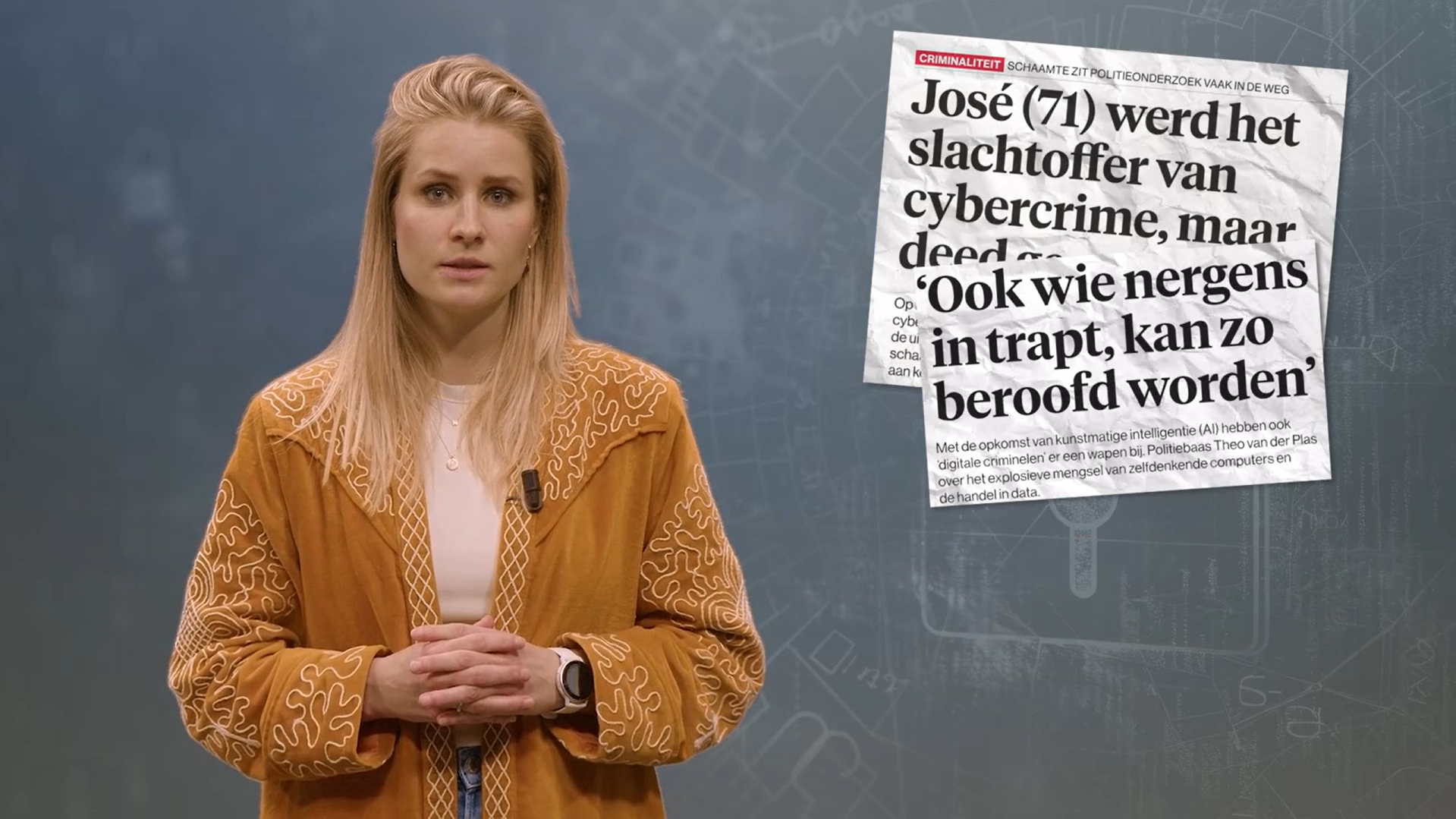
Our goal is to establish the facts
The mayor of Zaltbommel had to step down this year. That happened after investigative work by and the persistence of reporter Brigit Groeneveld.
C
hecking those in power is one of the most important tasks of our journalists at Brabants Dagblad. We are not out to bring people down, but we do want to get to the truth. If a mayor is acting improperly, for instance, we feel that this should be addressed.
In this example – the mayor of Zaltbommel allegedly replaced the windows of his listed building illegally – our reporter had received a tip. She spent weeks uncovering the information and searching for evidence of a deliberate violation of the law.
The latter, i.e. proving that his actions were deliberate, was not immediately possible because after publication of the initial story the mayor got away with it by telling the Municipal Council that there had been no malicious intent. They believed him and he was allowed to stay on.
However, Groeneveld continued to suspect intent and did not let the matter rest. She found the name of the building contractor in one of the documents that she had received. A phone call with him provided the breakthrough. The building contractor had warned the mayor beforehand. After publication of this news, the politicians had had enough and the mayor announced his resignation.
The fall of the mayor was not the goal of Brabants Dagblad, but uncovering the truth was. Without our journalists checking those in power, they would have free reign. And we now know what the consequences of this can be for people and society, and that endorses the importance of close-knit local journalism.
André Trompers
Interim Editor-in-chief of Brabants Dagblad


ADR Nieuwsmedia zit in de haarvaten van Nederland
Algemeen Dagblad en de zeven regionale titels van DPG Media vormen één groep: ADR Nieuwsmedia. Binnen deze grootste nieuwsorganisatie van Nederland wordt nauw samengewerkt. Hoe gebeurt dat?
We vragen het onze abonnees in Gelderland, Brabant, Twente of Zeeland elk jaar opnieuw, maar we kennen het antwoord: zij lezen onze sites, apps en kranten vooral vanwege het regionale nieuws. Dat geldt trouwens niet alleen voor lezers uit die genoemde streken. Ook de AD-lezers in en rond Den Haag, Utrecht of Rotterdam zetten ‘lokaal nieuws’ bovenaan hun lijstje van favoriete artikelen. Meteen daaronder staat vaak hun favoriete voetbalclub.
Het enorme belang dat abonnees stellen in nieuws uit hun eigen buurt deed kranten decennia geleden besluiten zich te concentreren op de beste regionale verslaggeving. Voor zaken als binnenlandse politiek, buitenland, economie, cultuur of topsport bundelden ze de krachten in gemeenschappelijke persdiensten. Zo ontstonden de Zuid-Oost Pers, de GPD en de Wegener Persdienst. Die laatste persdienst verdween toen DPG Media tien jaar geleden de regionale kranten van Wegener kocht. AD en de zeven regionale kranten werken sindsdien samen in ADR Nieuwsmedia.
Samenwerken
Een centrale redactie met 200 journalisten van het AD en de samenwerkende titels in de regio, verzorgt vanuit Rotterdam het (inter)nationale nieuws. Zodat De Gelderlander zich kan richten op de eigen provincie en de PZC zich alleen bezig hoeft te houden met Zeeland.
De stroom nieuws gaat niet alleen van Rotterdam naar de regio, maar ook omgekeerd. Als er in Eindhoven of Enschede iets groots gebeurt, delen het ED en Tubantia dit nieuws onmiddellijk met het AD en de andere regionale titels. Het maakt ADR, zeker buiten de Randstad, tot een van de snelste nieuwsorganisaties en zeker de meest wijdvertakte. Want ADR beschikt over ruim 800 journalisten en een netwerk van lokale correspondenten. ADR zit in de haarvaten van Nederland.
Leidt dit tot eenheidsworst? Allerminst. Het nieuws uit Oost-Nederland beheerst de homepage van de Stentor, dat uit de regio Breda de voorpagina van BN DeStem – en zo verder. De lay-out van ADR-kranten en -online-platforms komen overeen, de inhoud verschilt sterk, want elke titel maakt eigen, onafhankelijke keuzes. De eigenheid en uniciteit van de unieke regionale verslaggeving bepaalt immers het succes van een titel. Ruim 900.000 abonnees en bijna vijf miljoen online bezoekers zijn er dagelijks blij mee.
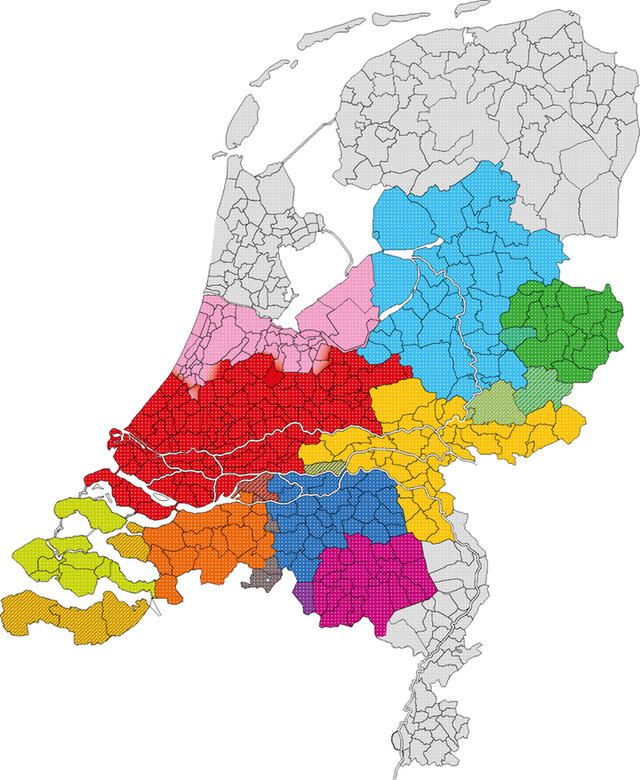







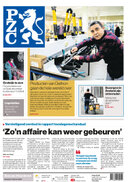

De regionale titels in Nederland
Ad Regio
de Stentor
Tubantia
De Gelderlander
Brabants Dagblad
Eindhovens Dagblad
BN DeStem
PZC
AD Landelijk
Kies jouw locatie

indebuurt.nl
Sinds een aantal jaren maakt ook indebuurt.nl onderdeel uit van ADR. Het gratis platform richt op alles wat een stad leuk maakt voor haar inwoners en is sterk gericht op het bieden van service. Zo geeft indebuurt.nl bezoekers informatie over nieuwe winkels, over uitgaan, activiteiten in de stad en bijzondere plekken. Inwoners worden uitgenodigd de redactie van tips te voorzien, of vrijblijvend teksten, foto’s of video’s aan te leveren. De makers van ‘indebuurt’ hebben de ambitie om gebruikers nauwer bij het stadsleven te betrekken.
indebuurt.nl is actief in 34 steden, vooral in plaatsen waar ook ADR-titels actief zijn. Artikelen van indebuurt.nl staan daarom ook op de sites en apps van de regionale titels van ADR en enkele malen per week in de gedrukte kranten. Per maand bezoeken ruim 2,5 miljoen mensen een van de secties. Daarmee staat ‘indebuurt’ in de top 10 van nieuwssites in Nederland.
Journalistiek & techniek
ADR-redacties maken gebruik van technische innovaties op het gebied van automatisering en kunstmatige intelligentie (AI). Het gebruik van spellingscorrectie is bijvoorbeeld al sinds jaar en dag ingeburgerd. Het is per definitie een journalist die bepaalt welk onderwerp wordt opgepakt en of wat er wordt gepubliceerd. AI wordt – nu nog experimenteel – gebruikt om teksten van bijvoorbeeld persberichten snel samen te vatten of tot een kort artikel te verwerken. Daarnaast kan AI ook suggesties doen voor spelling, grammatica, koppen en ideeën voor verhalen. De journalist bepaalt of suggesties worden overgenomen. We noemen deze werkwijze het mens-machine-mens-principe.
De redactie gebruikt automatisering het meest voor serviceberichten, zoals lokale weerberichten voor alle 342 gemeenten in Nederland. Als de verwachting is dat de temperatuur daalt van 2 naar -2, staat er een zin klaar die deze data-informatie vertaalt naar bijvoorbeeld ‘het gaat vriezen’ of ‘het kwik daalt onder nul’. De redactie vermeldt bij dit soort berichten dat ze automatisch zijn samengesteld. Automatisering kan ook worden gebruikt om op basis van data voor alle gemeenten in Nederland berichten te maken over bijvoorbeeld de afname van het gebruik van zonnepanelen of de toename van winkelleegstand. Het is een gespecialiseerde journalist die hiervoor data verzamelt en een basisbericht schrijft, eventueel aangevuld met andere bronnen. De techniek helpt ons om daar voor elke gemeente een eigen versie van te maken.
Cijfers
achter AD en de regionale titels
Gemiddeld dagelijks bereik
Het dagelijks bereik is een veelgebruikte indicatie van de impact die digitale journalistiek heeft. Maandbereik wordt ook weergegeven in de nationale monitors, maar daarin spelen eenmalige bezoekers van de sites een relatief grote rol.
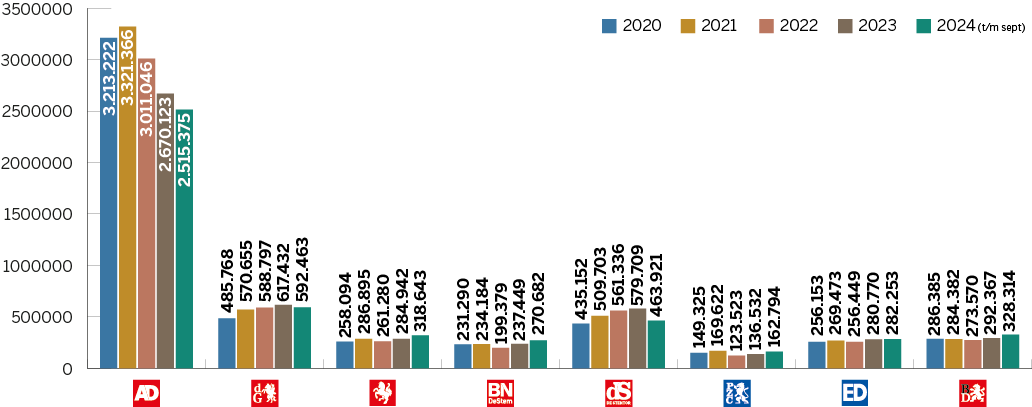
Journalisten in vaste dienst in 2024
Dit geeft de omvang van de redactie weer, omgerekend in voltijds banen (fte). Het zijn zowel de verslaggevers als de chefs, eindredacteuren, vormgevers, beeldredacteuren, video- en podcastmakers en onlineredacteuren. Om het beeld zuiver te houden zijn de freelance journalisten niet opgenomen. Die leveren eveneens een belangrijke bijdrage in de vorm van artikelen, columns, beeld, audio en video. Het zijn er soms honderden per titel. Aantal en werkzaamheden fluctueren van jaar tot jaar.

Meer info
Gemiddeld aantal unieke artikelen per dag
Dit is de hoeveelheid eigen artikelen die elke redactie produceert, van groot tot klein. De meeste redacties publiceren meer dan dat: bijvoorbeeld artikelen van de centrale redactie in het geval van de regionale kranten, of (in België) artikelen van collega-titels die worden doorgeplaatst. Die zijn niet meegeteld, net zo min als de kleine lokale berichten die automatisch worden gemaakt (zoals het weer en 112-berichten), of de doorgeplaatste artikelen van ‘Indebuurt’. Zo ontstaat het zuivere cijfer van wat de eigen redactie dagelijks maakt.

Meer info
Betalende abonnees
Dit is de som van papieren, digitale en hybride abonnementen. Het is het gemiddelde aantal over het desbetreffende jaar.

Rapportcijfers van eigen abonnees
Dit cijfer wordt gegeven door deelnemers aan een jaarlijks lezersonderzoek dat voor de meeste titels wordt gehouden.

Vertrouwenscijfer uit onderzoek
Dit cijfer is afkomstig uit recent onderzoek naar merkvertrouwen in opdracht van DPG Media. Daarbij geeft een algemeen publiek, dus niet alleen abonnees of bezoekers, vertrouwen in verschillende nieuwsmedia aan op een schaal van 0 (helemaal niet betrouwbaar) tot 10 (uiterst betrouwbaar). Daarnaast worden abonnees uitgesplitst, die hun titel doorgaans meer dan gemiddeld vertrouwen. Deze onderzoeksmethode en de uitkomsten komen overeen met die van het jaarlijkse Digital News Report van het Reuters Institute in Oxford. De Nederlandse en Vlaamse gemiddelde vertrouwenscijfers liggen in die monitor hoger dan die van nieuwsmedia in de omringende Europese landen.
Algemeen publiek
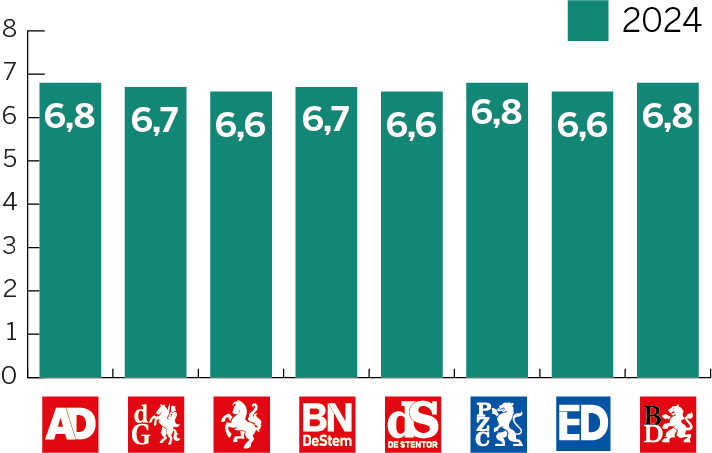
Abonnees
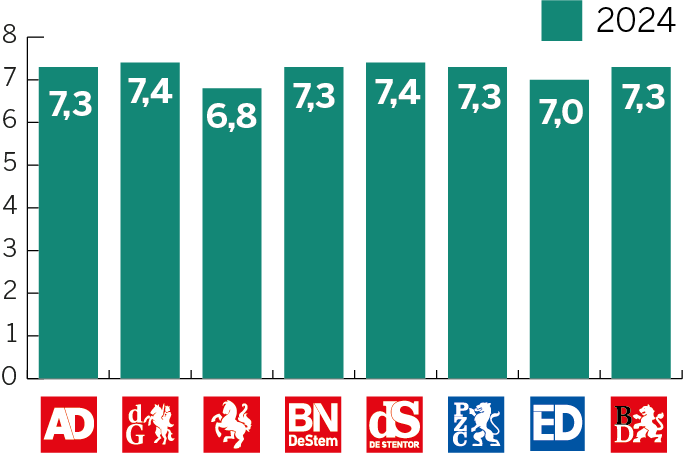
Aantal podcastafleveringen per jaar van alle titels
Deze cijfers geven aan hoeveel podcasts er door de verschillende titels zijn ontwikkeld.
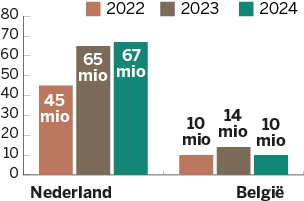
Gemiddeld aantal unieke video's per dag
Deze cijfers geven aan hoeveel video's er door de verschillende titels zijn ontwikkeld.
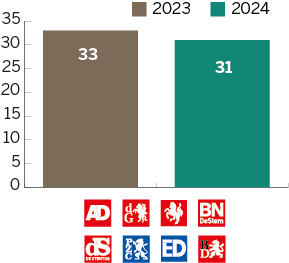
Dagelijks bereik
Gemiddeld dagelijks bereik
Het dagelijks bereik is een veelgebruikte indicatie van de impact die digitale journalistiek heeft. Maandbereik wordt ook weergegeven in de nationale monitors, maar daarin spelen eenmalige bezoekers van de sites een relatief grote rol.

Betalende abonnees
Betalende abonnees
Dit is de som van papieren, digitale en hybride abonnementen. Het is het gemiddelde aantal over het desbetreffende jaar.

Rapportcijfer van abonnees
Rapportcijfers van eigen abonnees
Dit cijfer wordt gegeven door deelnemers aan een jaarlijks lezersonderzoek dat voor de meeste titels wordt gehouden.

Journalisten in vaste dienst
Journalisten in vaste dienst in 2024
Dit geeft de omvang van de redactie weer, omgerekend in voltijds banen (fte). Het zijn zowel de verslaggevers als de chefs, eindredacteuren, vormgevers, beeldredacteuren, video- en podcastmakers en onlineredacteuren. Om het beeld zuiver te houden zijn de freelance journalisten niet opgenomen. Die leveren eveneens een belangrijke bijdrage in de vorm van artikelen, columns, beeld, audio en video. Het zijn er soms honderden per titel. Aantal en werkzaamheden fluctueren van jaar tot jaar.

Meer info
Unieke artikelen per dag
Gemiddeld aantal unieke artikelen per dag
Dit is de hoeveelheid eigen artikelen die elke redactie produceert, van groot tot klein. De meeste redacties publiceren meer dan dat: bijvoorbeeld artikelen van de centrale redactie in het geval van de regionale kranten, of (in België) artikelen van collega-titels die worden doorgeplaatst. Die zijn niet meegeteld, net zo min als de kleine lokale berichten die automatisch worden gemaakt (zoals het weer en 112-berichten), of de doorgeplaatste artikelen van ‘Indebuurt’. Zo ontstaat het zuivere cijfer van wat de eigen redactie dagelijks maakt.

Meer info
Vertrouwenscijfer uit onderzoek
Vertrouwenscijfer uit onderzoek
Dit cijfer is afkomstig uit recent onderzoek naar merkvertrouwen in opdracht van DPG Media. Daarbij geeft een algemeen publiek, dus niet alleen abonnees of bezoekers, vertrouwen in verschillende nieuwsmedia aan op een schaal van 0 (helemaal niet betrouwbaar) tot 10 (uiterst betrouwbaar). Daarnaast worden abonnees uitgesplitst, die hun titel doorgaans meer dan gemiddeld vertrouwen. Deze onderzoeksmethode en de uitkomsten komen overeen met die van het jaarlijkse Digital News Report van het Reuters Institute in Oxford. De Nederlandse en Vlaamse gemiddelde vertrouwenscijfers liggen in die monitor hoger dan die van nieuwsmedia in de omringende Europese landen.
Algemeen publiek
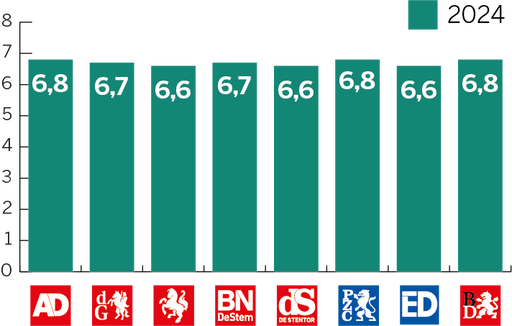
Abonnees
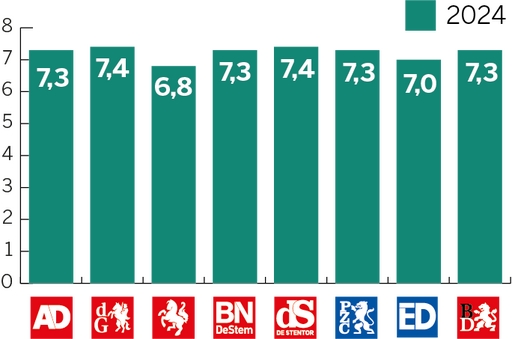
Aantal podcastafleveringen
Aantal podcastafleveringen per jaar van alle titels
Deze cijfers geven aan hoeveel podcasts er door de verschillende titels zijn ontwikkeld.

Aantal unieke video's
Gemiddeld aantal unieke video's per dag
Deze cijfers geven aan hoeveel video's er door de verschillende titels zijn ontwikkeld.

